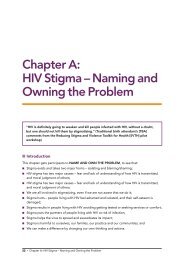Implementing Multiple Gender Strategies to Improve HIV and ... - ICRW
Implementing Multiple Gender Strategies to Improve HIV and ... - ICRW
Implementing Multiple Gender Strategies to Improve HIV and ... - ICRW
You also want an ePaper? Increase the reach of your titles
YUMPU automatically turns print PDFs into web optimized ePapers that Google loves.
• National Survey on the Reproductive Health <strong>and</strong> Sexual Behavior of<br />
Young People <strong>and</strong> Adolescents (INJAD): This is a nationally<br />
representative, population-based survey of youth ages 15–24 designed<br />
<strong>to</strong> provide estimates at the national, regional, <strong>and</strong> provincial levels.<br />
Baseline data were collected in 2001; a follow-up survey is proposed<br />
for 2010. Data are collected on attitudes <strong>to</strong>ward sexuality <strong>and</strong> gender;<br />
reproductive his<strong>to</strong>ry <strong>and</strong> maternal outcomes; <strong>and</strong> sexually transmitted<br />
infections <strong>and</strong> <strong>HIV</strong> <strong>and</strong> AIDS-related knowledge, attitudes, <strong>and</strong><br />
behaviors.<br />
• Management <strong>and</strong> Organizational Sustainability Tool (MOST):<br />
Developed by Management Sciences for Health, this <strong>to</strong>ol provides a<br />
qualitative assessment of the effectiveness of program activities <strong>and</strong><br />
recommendations for improvement. It addresses, for example, strategic<br />
planning <strong>and</strong> use of data for decision-making purposes. This <strong>to</strong>ol is<br />
used <strong>to</strong> assess the effectiveness of program management in each of<br />
the three components: school-based program, out-of-school program<br />
<strong>and</strong> youth-friendly sexual <strong>and</strong> reproductive health services.<br />
• Focus groups (community-based or program-based): Conducted<br />
biennially as part of the KAPB survey, focus group discussions identify<br />
the range of attitudes <strong>and</strong> beliefs on relevant <strong>to</strong>pic areas that are later<br />
addressed in outreach materials. These are conducted <strong>to</strong> facilitate<br />
materials development <strong>and</strong> evaluation, <strong>and</strong> can be used <strong>to</strong> explore the<br />
perceived need for services, barriers <strong>to</strong> care, quality of care, <strong>and</strong><br />
program improvement ideas. This <strong>to</strong>ol assesses all programmatic<br />
activities: the school-based program, out-of-school program, <strong>and</strong> youthfriendly<br />
sexual <strong>and</strong> reproductive health services.<br />
• Recall studies for mass media activities: In these studies, a population<br />
sample is selected <strong>and</strong> surveyed <strong>to</strong> assess if the media activity was<br />
remembered <strong>and</strong> how well, if key messages were unders<strong>to</strong>od <strong>and</strong><br />
retained, <strong>and</strong> if any action was taken as a result of exposure. This is<br />
used <strong>to</strong> assess all mass media programs.<br />
Evaluation Results • Formative evaluation process: No results provided.<br />
• Client exit interviews: Data currently are being analyzed using EPI<br />
INFO <strong>and</strong> SPSS. A follow-up survey will be conducted by March 2009.<br />
• KAPB survey: A steadily increasing proportion of respondents report<br />
obtaining information about sexual <strong>and</strong> reproductive health from<br />
activists (44 percent in 2003, compared <strong>to</strong> 66 percent in 2005 <strong>and</strong><br />
87 percent in 2007). Results show an inconsistent pattern over time<br />
among respondents who agree with the statement that a woman who<br />
carries a condom is interested in having sex (19.5 percent in 2003,<br />
compared <strong>to</strong> 13 percent in 2005 <strong>and</strong> 18 percent in 2007).<br />
• INJAD: Results are pending the follow-up survey in 2010.<br />
• MOST: The implementers involved at the national <strong>and</strong> local level have<br />
good information about the objective, mission, <strong>and</strong> values of the<br />
program. <strong>Strategies</strong>, systems, <strong>and</strong> moni<strong>to</strong>ring <strong>and</strong> evaluation are in<br />
place. Results indicate that some areas for improvement include<br />
logistics, human resource policies, <strong>and</strong> integration of the financial<br />
procedures of the Mozambique government <strong>and</strong> those requested by<br />
78
















